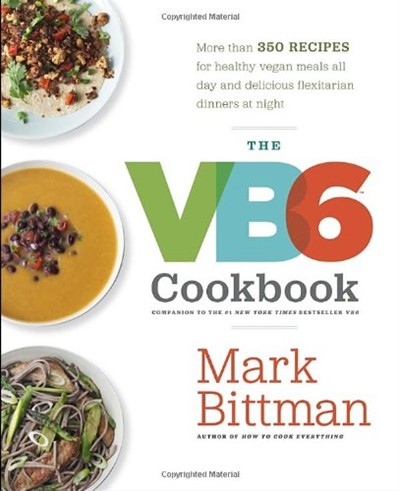Be flexitarian with Bittman
May 9, 2014 by Jane Mark
Bittman is a fixture on many EYB member bookshelves, both because
he’s written several excellent cookbooks and because every one of
his recipes is indexed on the EYB site (15,643 and
counting). A former columnist for the Times
Dining section, this prolific author is now back
with the groundbreaking The VB6
Cookbook (Vegan
Before 6
P.M.), where he provides the tools needed to
make the switch to a “flexitarian” diet, including lists for
stocking your pantry, strategies for eating on the
go, cooking tips, and a complete 28-day eating plan. Bittman
sat down with EYB to answer questions about his book, including
what he thinks will win over meat lovers.
Mark
Bittman is a fixture on many EYB member bookshelves, both because
he’s written several excellent cookbooks and because every one of
his recipes is indexed on the EYB site (15,643 and
counting). A former columnist for the Times
Dining section, this prolific author is now back
with the groundbreaking The VB6
Cookbook (Vegan
Before 6
P.M.), where he provides the tools needed to
make the switch to a “flexitarian” diet, including lists for
stocking your pantry, strategies for eating on the
go, cooking tips, and a complete 28-day eating plan. Bittman
sat down with EYB to answer questions about his book, including
what he thinks will win over meat lovers.
You can enter our contest for a chance to win one of five copies of VB6.
—————————————————————————————–
What do you see as the primary health benefits of following the VB6 diet?
Start with eating real food. You might end there, too. But wiping out junk food from your diet is a huge thing, and will likely result in weight loss and favorable blood numbers. Reducing the intake of industrially produced animal products and increasing your intake of plants is beneficial as well.
A lot of the popular diet books right now seem to be Paleo (no dairy or grains) or sugar-free. What are your views on these diets and how much have you incorporated some of these ideas into The VB6 Cookbook?
Hyperprocessed carbs are almost certainly detrimental to health, and it’s pretty clear your body can’t tell the difference between white bread and cookies. Saying that “grains are bad,” however, is a different story; whole grains are processed by the body completely differently, and are probably beneficial. I do think the word “Paleo” is being used to promote a high meat diet, and in that sense is probably not helpful; if it really meant “eat like a hunter-gatherer” that would be a different story.
 One of the
criticisms about a vegan diet is that it is often low in protein
and too high in starchy carbs. How do the recipes in The
VB6 Cookbook prevent that?
One of the
criticisms about a vegan diet is that it is often low in protein
and too high in starchy carbs. How do the recipes in The
VB6 Cookbook prevent that?
We don’t do a lot of “starchy” (by which I think you mean hyperprocessed) carbs. And there’s plenty of protein in beans and even vegetables. But bear this in mind: VB6 is not a vegan diet. It’s a semi-vegan diet. If you’re worried about protein, have some eggs or cheese or a chunk of an animal for dinner. You’ll get plenty.
Do you anticipate following the VB6 rules for the rest of your life (with occasional lapses for bagels, lox and cream cheese on a Sunday morning)?
Yes. It’s not a two week diet. It’s a change in your permanent diet. I’m on year 8 and it’s just second nature now.
Do you have advice for someone who prepares most of his/her family’s meals and wants to try VB6, but whose other family members are reluctant?
Yeh. Don’t tell them you’re doing it. Just run out of eggs & bacon for breakfast and give them oatmeal or fruit salad or pancakes. If you have control over their lunches, pack salads or good soups. And keep dinner as before.
Do you have any recipe recommendations from the book you think will win over dedicated meat-lovers?
I do think the tofu chorizo is amazing. But having said that, I like all of these recipes, or I wouldn’t have done the book.
What recipes in your book would reverse someone’s prejudices about tofu?
That one.
Breakfast would seem to be a tough meal to go vegan, at least for those into yogurt, eggs or cereal and milk. What do you suggest as vegan alternatives that give you the boost your metabolism needs at the start of the day?
Most of us get going with coffee or other caffeine, not the foods you mentioned. I eat whole grain porridges many mornings, or non-dairy smoothies, or tofu scrambles, or fruit salad, and all of those seem totally fine.
Categories
- All Posts (7077)
- Antipasto (2207)
- Author Articles (250)
- Book News (944)
- Cookbook Giveaways (996)
- Cookbook Lovers (262)
- Cooking Tips (116)
- Culinary News (299)
- Food Biz People (558)
- Food Online (800)
- Holidays & Celebrations (277)
- New Cookbooks (154)
- Recipes (1520)
- Shelf Life With Susie (231)
- What's New on EYB (134)
Archives
Latest Comments
- Goulashgirl on Any way you slice it
- ChefClaireFVS on French at Heart – Cookbook Giveaway
- ChefClaireFVS on 20 Amici – 40 Ricette Cookbook Giveaway
- kitchen_chick on Salt Sugar MSG Cookbook Giveaway
- kitchen_chick on Balli Balli – Cookbook Giveaway and Quick Bites
- SCH on Introducing libraries to EYB at ALA
- FrenchCreekBaker on Four outstanding independently published cookbooks worth your attention
- breakthroughc on Any way you slice it
- Marymac54 on French at Heart – Cookbook Giveaway
- Lizkay99 on For the Love of Lemons by Letitia Clark – Giveaway